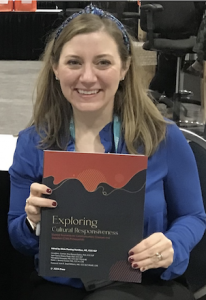This session is designed to support young children’s communication skills, including speech and language acquisition, by building both non-SLP educators as well as early- to mid-career SLPs’ understanding of typical and atypical developmental communication milestones across cultures. Participants will learn about culturally appropriate assessment and intervention practices. This session will also focus on techniques, strategies, and resources that caregivers and practitioners can use to increase authentic communication across contexts. Finally, participants will learn a reflection technique that focuses on increasing culturally responsive practice across one’s professional career.
Listen to this podcast resource: ASHA Voices: Cultural Responsiveness Through Story and Self-Reflection.
Session Objectives
In this session, participants will:
- Learn about typical and disordered language development for monolingual and multilingual learners in early childhood
- Review culturally responsive and appropriate assessment tools for measuring the communication skills of multilingual learners
- Practice techniques and strategies that can be used to increase communication skills across contexts
- Practice using a self-reflection exercise to increase cultural responsiveness across one’s professional practice
Additional information
Timeline/breakdown of session:
Part I: Typical vs disordered bilingualism/language development
Part II: Assessment of multilingual children
Part III: Treatment of multilingual children
Part IV: Self-reflection practices
The presenter asks that participants think of a personal scenario where they feel cultural misunderstandings may have been at play. Participants should be willing to discuss this scenario/situation with others in a small group setting and be willing to reflect on the scenario.
MN CoE innovations supported
EQIP, Classroom Engagement Model
Intended audience
Early childhood educators, related service providers, SLPs
Intended skill level
Beginner to Intermediate
Each session requires a minimum of 10 attendees to be held. If there are fewer than 10 registered for a specific session, you will be contacted and asked to select another session.
Instructor
 Alicia Fleming Hamilton, MS, CCC-SLP, Bilingual Speech-Language Pathologist
Alicia Fleming Hamilton, MS, CCC-SLP, Bilingual Speech-Language Pathologist
Alicia Fleming Hamilton (she/her/hers) is a bilingual (English-Spanish) speech-language pathologist who works with the Minneapolis Public Schools. She specializes in bilingual assessment in early childhood populations, bilingual clinical education, and multicultural assessment and intervention. Alicia is a clinical supervisor. She was the 2019 president of the Minnesota Speech-Language-Hearing Association, and served on the ASHA Multicultural Issues Board, Speech-Language Pathology Advisory Council. Currently, Alicia serves on the Board of Ethics.

